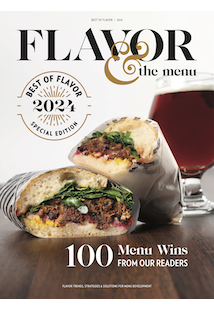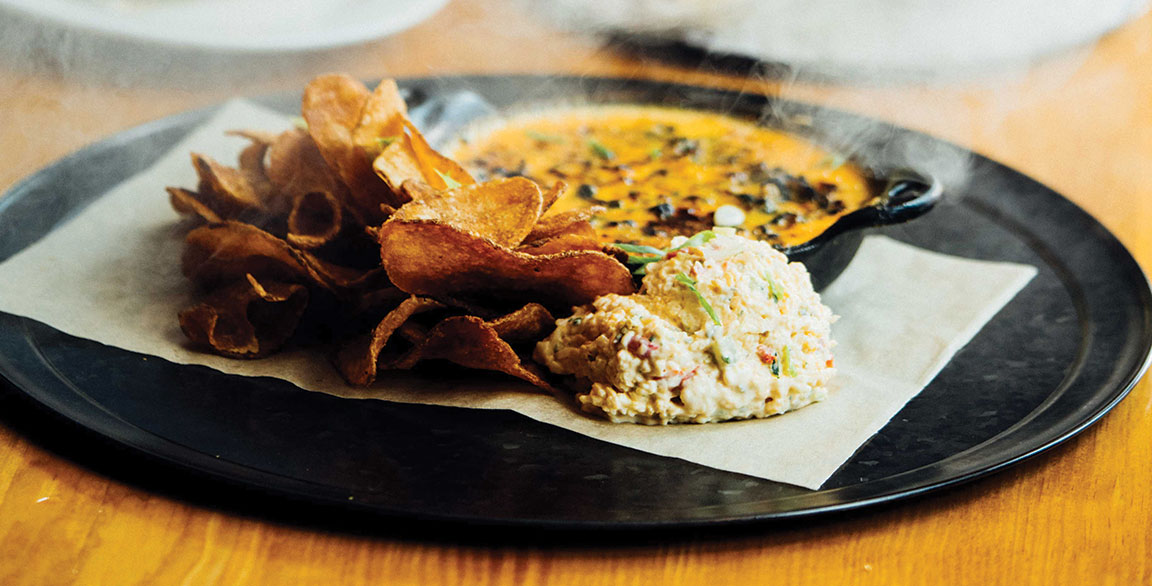

If ever there was a time for cheese, it’s now. Comforting, rewarding, delicious and indulgent—it satisfies and soothes the soul while delighting the palate, making it particularly attractive to consumers during these unsettling times. Chefs, of course, are always drawn to the cheese category for inspiration, recognizing that its ability to improve a menu item is significant.
With close to 900 varieties to choose from and an infinite number of ways to use those varieties, cheese-centric menu innovation never stops. Nor should it. Cheese boosts menu appeal. Sixty percent of operators reveal that adding cheese helps a dish sell better, according to Datassential.
With so many ways to leverage the popularity of cheese and maximize its crave factor, a sweep across the country to check in with trend-forward concepts reveals fresh opportunities for creative cheese-centric menu ideas.
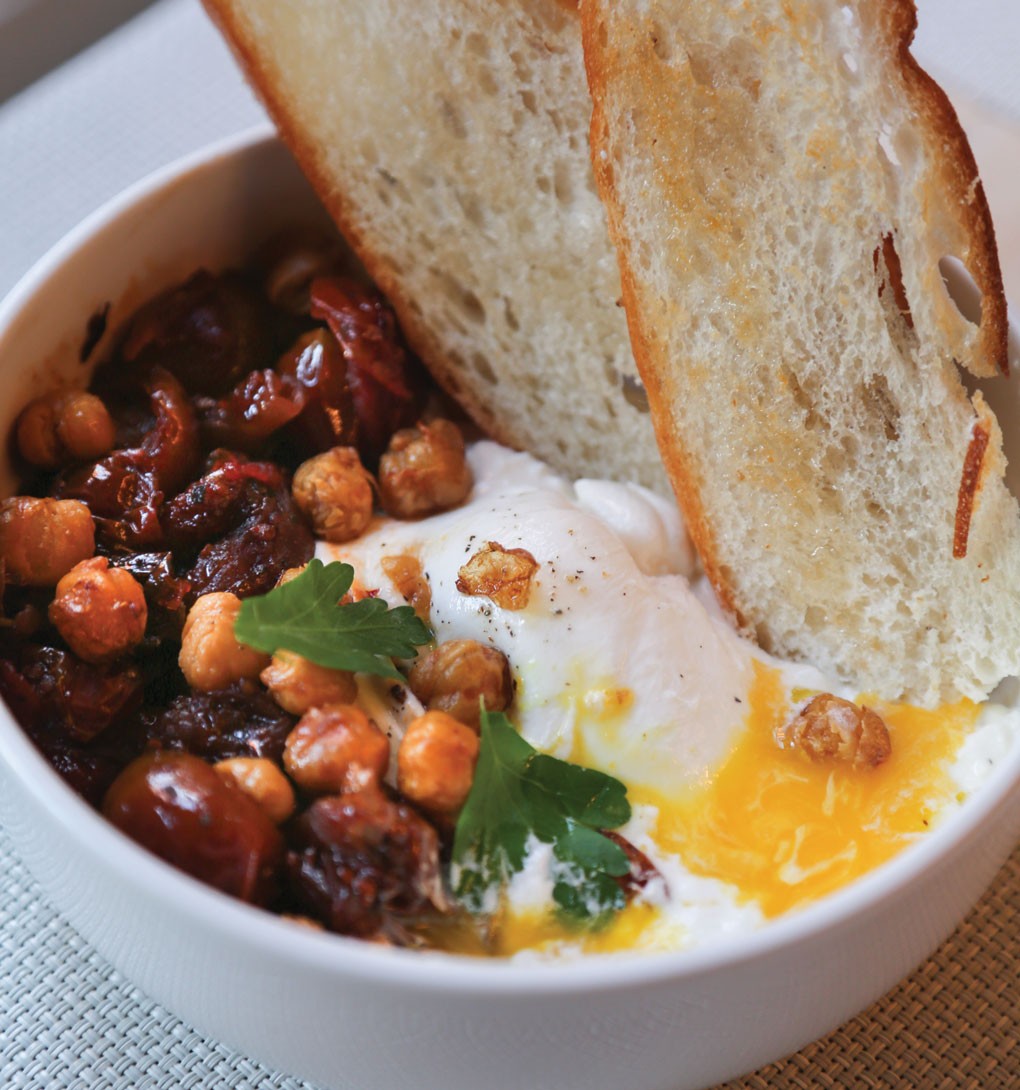 Katie Burton
Katie Burton The Egg Shop in New York menus the Burrata and Egg Yolk, creating a novel twist on the classic poached egg by placing a yolk inside a round of burrata and pairing it with a tomato agrodolce, deep-fried chickpeas, fresh parsley and toast drizzled with truffle oil.
CHEESE’S SOFT SPOT
Chefs are leveraging burrata’s fresh, dairy flavor and luxe texture in novel ways, moving it beyond the simple pleasure of a lobe drizzled with olive oil on top of crusty bread. Nick Korbee, chef/partner of the egg-centric concept appropriately called The Egg Shop, with two locations in New York City, plays off the resemblance that burrata shares with a poached egg.
In the Burrata and Egg Yolk, he scoops out a portion from the center of a burrata round and stuffs it with an egg yolk, then carefully pinches it closed. The result sees a doubling down of silky textures with contrasting flavors that complement each other in a surprising way. The appetizer is rounded out by a tumble of double-crisped chickpeas, a dollop of tomato agrodolce and a side of truffle toast.
Vanilla ice cream has long been a favorite of Dominique Ansel, a James Beard award-winning pastry chef renowned for his imaginative creations, such as the wildly successful Cronut. Always innovating, he sought to tweak the flavor notes that he loves in vanilla ice cream with a less-sweet profile.
His secret ingredient? Burrata cheese, which stands up well in cold temperatures, and he triple strains for an extra-smooth texture. His Burrata Ice Cream is topped with a drizzle of tangy balsamic caramel and housemade candy-sweet fragrant confit strawberries.
Echo & Rig, a slick steakhouse with locations in Las Vegas and Sacramento, Calif., uses the creamy cheese as a premium accent on a few of its menu items. Its Beets and Burrata Salad features a lobe of burrata, baby golden beets, arugula and walnut pesto.
At brunch, the Steakhouse Scramble sees housemade sausage, filet mignon, onions, bell peppers, pee wee potatoes, tomatoes and scrambled eggs. Burrata is mixed in, adding luxurious creaminess and matching the dish’s higher-end value perception.
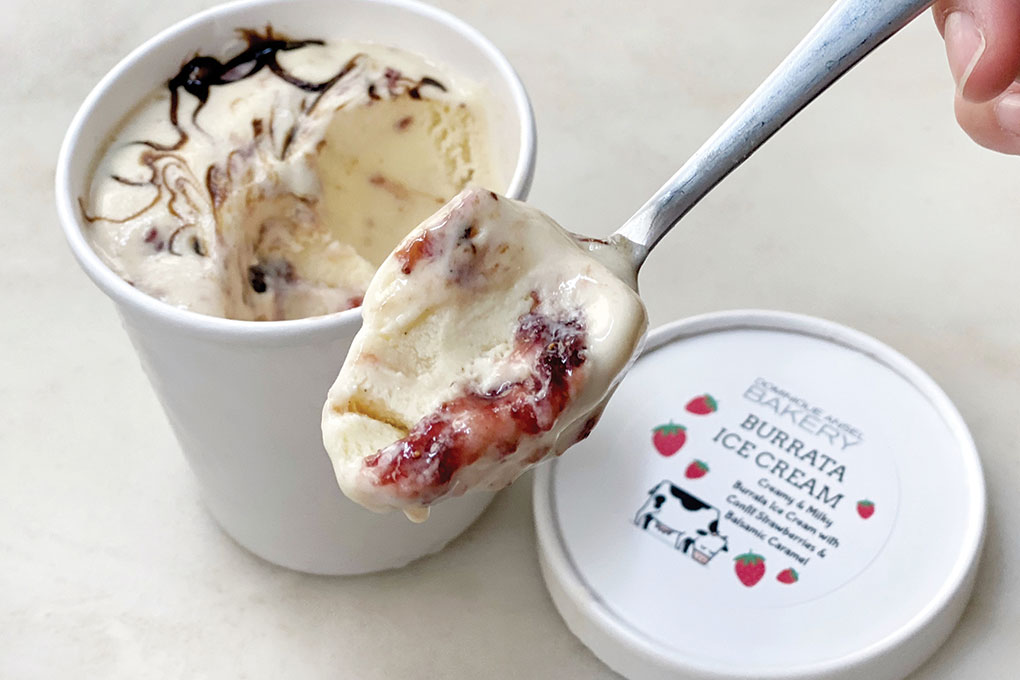 Dominique Ansel Bakery
Dominique Ansel Bakery Dominique Ansel Bakery in New York offers Burrata Ice Cream with balsamic caramel and confit strawberries.
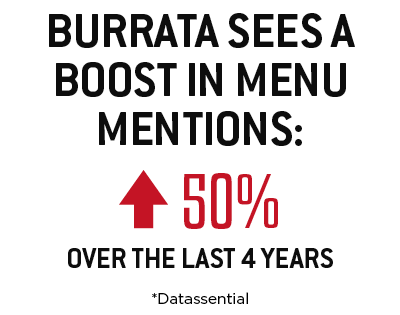
PIMENTO HEATS UP
The pimento cheese spread is often paired with a crackers- or veggie-based appetizer, thanks to its foundation of sharp cheddar, creamy mayonnaise and the sweet succulence of pimentos. But infusing heat brings complexity and added possibilities.
Spencer Rubin, founder/CEO of the fast-casual franchise Melt Shop, is on a mission to create bold, craveable flavors that “will blow your doors off.” Mike’s Hot Honey Bun is a popular item that delivers on that promise. The sandwich features fried chicken, cheddar, jalapeño pimento cheese and hot honey sauce on a potato bun. “It’s great from a flavor standpoint and texturally, the soft cheese works well with the crispy chicken,” he says. “The savoriness, acidity and heat all balance well.”
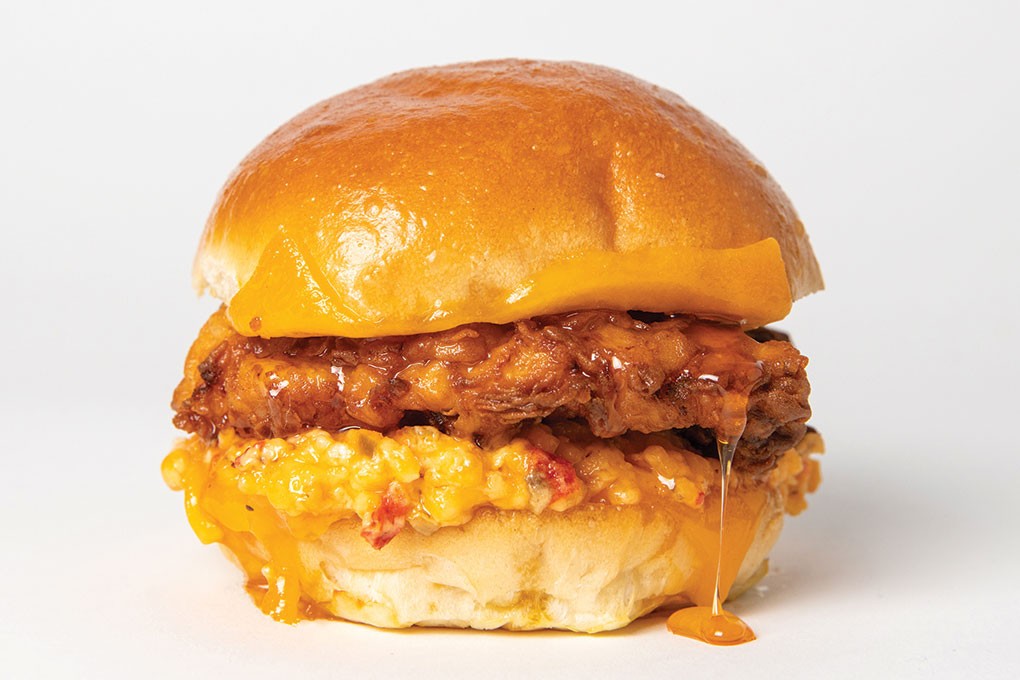 Melt Shop
Melt Shop Dripping with hot honey sauce and thickly piled jalapeño pimento cheese, the sweet and savory combination of Mike’s Hot Honey Bun chicken sandwich is driving customers to Melt Shop in New York City.
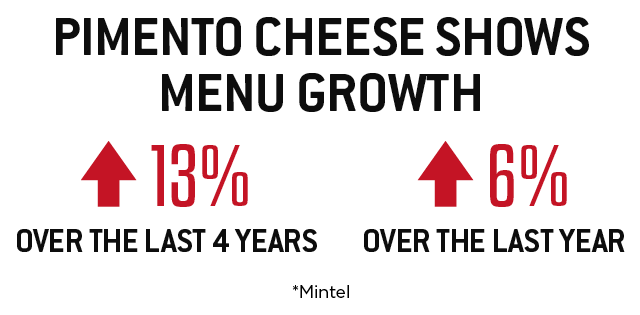
A NEW VIEW ON VEGAN
Like a host of other plant-based proteins, vegan “cheeses” have come a long way, benefitting from the patient experimentation of innovators determined to meet the flavor needs of a growing demographic.
Doron Petersan, chef/owner of Fare Well, serving up “veggie-centric comfort food” in Washington, D.C., shares her secret for success: fermentation. Her housemade almond-cashew “burrata” is said to boast the even consistency and creaminess of the real deal.
She cites time, temperature and the addition of a probiotic as critical elements of her approach: “We have such a short window of time to get the ‘mozzarella’ right. Temperature in the first 24 hours is important.” The vegan cheese actually takes about 48 hours to develop its initial flavor, deepening as it ages for up to two weeks under refrigeration.
Vegan “cheeses” are becoming more widely embraced by today’s diners. Datassential finds a 46 percent growth rate in vegan “cheese” menu mentions in 2019, and a 216 percent growth over the last four years.
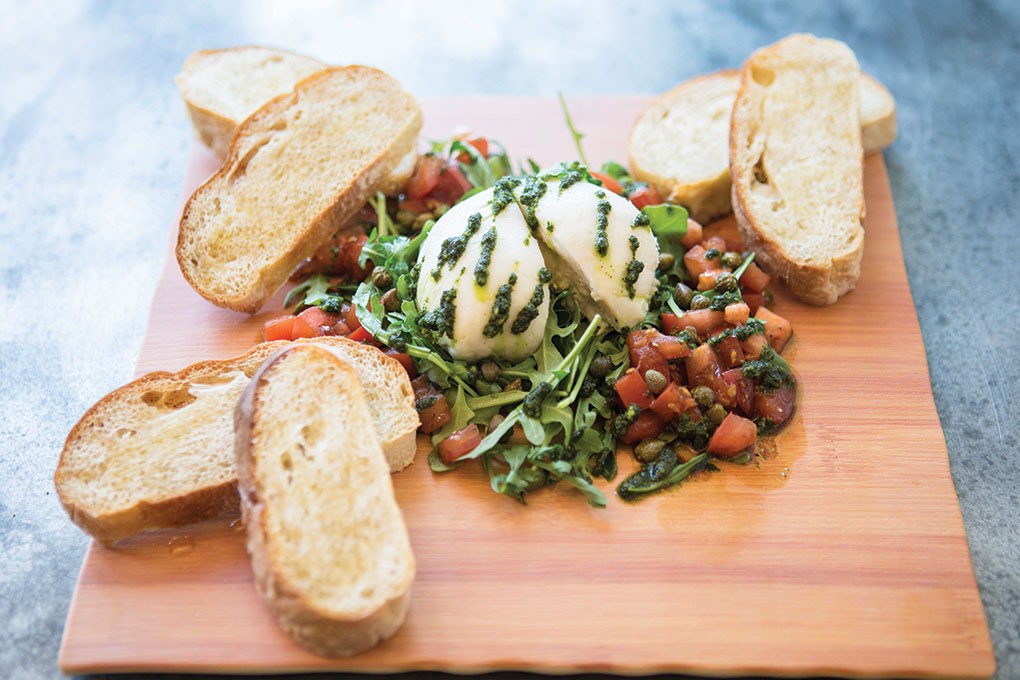 Fare Well
Fare Well Fare Well in Washington, D.C., menus a vegan burrata “cheese” made with cashew milk, almonds, lactic acid and the magic of time. It’s paired with pesto, balsamic-marinated tomatoes, capers, arugula and a toasted baguette.
WHERE THERE’S SMOKE…
Smoke adds depth and umami to a variety of foods, including cheese. Founders and head cheesemongers Danielle and Richard Sutton of St. James Cheese Company, a hybrid shop/restaurant concept in New Orleans, have elevated a conventional roast beef sandwich with the expressive flavor play of the Smokey Blue, which features house-smoked Mycella blue cheese, sliced roast beef and Worcestershire mayonnaise. After a spell in the smoker, the Mycella, a creamy, cow’s milk Danish blue cheese, gets a sharper, amped-up blue flavor that pairs particularly well with beef.
The Rustic, with four locations in Texas, leans into the theatre of smoke with its Smoked Dip Duo appetizer, presenting smoked brisket, spinach and smoked cheddar fondue, along with a cold pimento dip and smoked salt potato chips under a cloche misted by a veil of smoke.
Some smoked cheeses are less assertive and more nuanced. Look to the house favorite Shrimp and Grits at Dish Society, an all-day diner concept with multiple locations in Houston, as an example. Grilled Gulf shrimp sit atop smoked Gouda grits, smothered in a Tabasco-shallot butter sauce. Bacon crumbles finish the dish.
Chicago’s Mama Delia, a restaurant specializing in Spanish cuisine, features a smoked cheese to build complex flavor in one of its veg-centric dishes. A mild smoky-flavored Idiazábal cheese pressed from unpasteurized sheep’s milk stars in its Calabacín a la Brasa, a grilled baby zucchini dish with allium ash and aged rice vinegar vinaigrette.
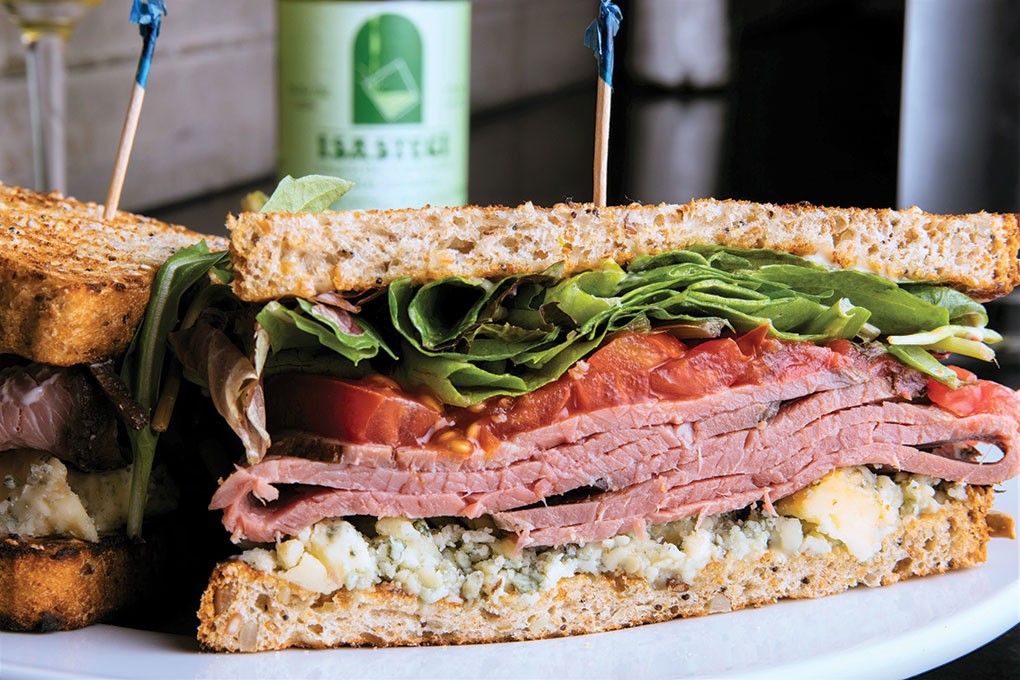 St. James Cheese Company
St. James Cheese Company At St. James Cheese Company, a New Orleans cheese shop/restaurant, Mycella blue cheese gets smoked in house to make its signature funk even more flavorful when included on a savory roast beef sandwich build.
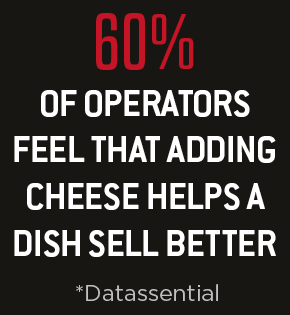
MAXIMIZING MOZZARELLA
Mozzarella, cheddar and Parmesan lead as the the big three in menu penetration, which isn’t really a surprise given their versatility and popularity. Zeroing in on fresh mozzarella, we’re tracking some interesting menu developments today, as chefs capitalize on its creamy, familiar profile.
At Bad Daddy’s Burger Bar, with 35 locations throughout North Carolina, South Carolina, Oklahoma, Georgia, Tennessee and Colorado, the Emilio’s Chicken Sandwich relies on fresh mozz as a mellow, unctuous counterpart to some of the handheld’s more flavor-forward ingredients. The build features a buttermilk fried chicken breast on a brioche bun topped with fresh mozzarella, jalapeño bacon, poblano pepper mayonnaise, guacamole, shredded lettuce, tomato and red onion.
“The fresh mozzarella adds a rich milky coolness against the heat of the jalapeño- seared bacon and our spicy poblano mayo,” says Mike Carroll, kitchen manager with Bad Daddy’s. “Its creamy texture blends in perfectly with the fresh-made guacamole that’s on the sandwich.”
At modern American restaurant Squared Barrels in Honolulu, the classic Caprese salad gets spun into a craveable appetizer. The Fried Caprese Bites sport breaded fresh mozzarella cubes and grape tomatoes with pesto sauce.
Sorriso, an Italian restaurant in Garden City Park, N.Y., uses fresh mozzarella in a shareable snack, giving classic nachos a new spin with its Italian Nachos: fried lasagna-noodle triangles piled high with sauce, peppers and fresh mozzarella.
And Mi Tocaya, a modern Mexican eatery in Chicago, taps mozzarella as a partner for Cotija, combining the two in its stuffed Roasted Poblanos.
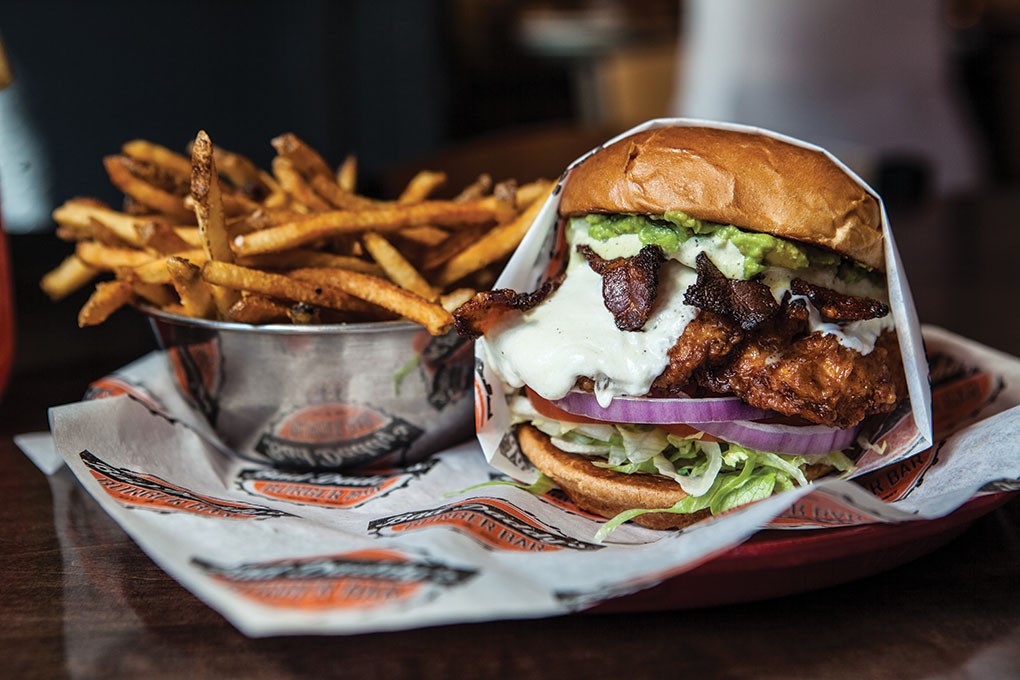 Bad Daddys
Bad Daddys Fresh mozzarella adds a “milky coolness” to balance the heat of jalapeño bacon and poblano mayo in Emilio’s Chicken Sandwich at Bad Daddy’s Burger Bar.

